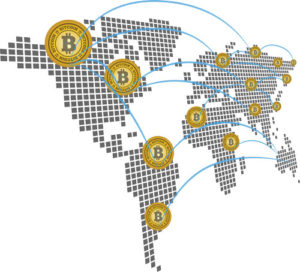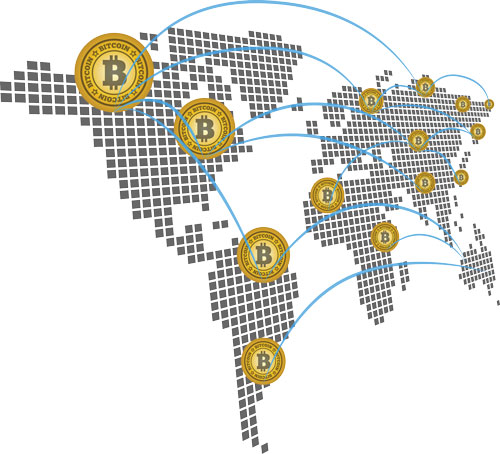 This P2P currency may not be taking over the world yet, but is one to watch as more travel companies mine its potential. By Hannah Koh, Xinyi Liang-Pholsena and Mimi Hudoyo
This P2P currency may not be taking over the world yet, but is one to watch as more travel companies mine its potential. By Hannah Koh, Xinyi Liang-Pholsena and Mimi Hudoyo
As if the travel industry hasn’t had enough, struggling to deal with disruptors like last-minute booking apps and the temperamental algorithms of big boys like Google and Facebook – here comes the bitcoin.
Las Vegas’ the D and Golden Gate casino hotels began accepting bitcoins this year, driven by consumer demand, and the first bitcoin ATM has just appeared on the tourist strip. Expedia also announced in June it is accepting the currency as a form of payment for hotel purchases. The OTA, however, declined to comment for this article.
In Asia, there is an ambitious project in Bali to turn the popular destination into a ‘bitcoin island’ by year-end, where bitcoin would be the currency of choice. Rakuten’s CEO, Hiroshi Mikitani, has also said the Japanese online retail giant will sooner or later accept bitcoins.
What, I hear you cry, are bitcoins? Is that the money they use in Pokemon games? Fret not, you are not alone in your digital alienation, so let’s go back to the basics.
The Oxford Dictionary describes bitcoins as “a type of digital currency in which encryption techniques are used to regulate the generation of units of currency and verify the transfer of funds, operating independently of a central bank”.
In other words, it’s a new international, borderless currency that has real world value and is being traded electronically through the Internet. It has a very basic ecosystem underpinning it, complete with digital wallets, transaction fees, exchanges, and a small but growing number of buyers and sellers.
The currency can be used anywhere on earth as long as it is accepted, leaves a public ledger of transactions verified by a chain of miners and has no to little service fees as compared to regular banking services.
Bang for your bitcoin
The advantages seem obvious enough – low transaction fees, no hassle of dealing with physical money and a reduced risk of theft.
The absence of bank and government control can also be a boon for peoples in countries where these institutions are corrupt, as well as a solution for the unbanked or people with no access to banking facilities, said Lawrence Chan, director of public relations of the Association of Crypto-currency Enterprises and Start-ups, Singapore (ACCESS), which was registered in Singapore only in mid-2014.
Tomas Forgac, founder of Coin Of Sale, which alongside with Bitcoin Indonesia, is aiming to convert Bali into a bitcoin island, has also been quoted in the media as suggesting it can be a way to help Indonesians cope with chronic inflation.
Peter Noldus, director of Pattaya Beer Garden in Thailand, which accepts bitcoins, said: “As there are virtually no fees, no possibility of chargebacks, and no risk to the merchant, it would be foolish not to accept bitcoins.
“Being an early adopter has brought in extra business from bitcoin people who tend to be very supportive of bitcoin merchants. We have had customers travel from Bangkok just so they can try out buying something with bitcoin.
“A more useful question would be why so few merchants in Thailand accept bitcoin when the use case is so extremely strong.”
Interestingly, bitcoins can be employed as a marketing strategy.
Stephen Schwer, general manager, MacKay Tourism, has been putting together an online booking system and payment gateway for tourism in Mackay, located on the eastern coast of Queensland, and is gunning for bitcoin payments to be allowed.
“The reason I want to accept bitcoin as a payment method is essentially for the sake of targeting a suitable market for our destination. The Mackay region is for people who want to try something new. We are off the beaten track. We are on the road less travelled. We appeal to people who want to try new things.
“The same goes for bitcoin users. They have a similar mindset to our target market, in that they aren’t afraid to tell their friends they are using a new, digital currency that hardly anyone else is using.”
High hopes, low uptake
Yet for the myriad benefits bitcoin enthusiasts espouse, take-up is inching along.
Asked why, ACCESS’ Chan said: “Unless your bread and butter comes from the technology industry, people tend to be more conservative and afraid of liability. It’s still super early days, and it was only one-and-a-half years ago that the Singapore tech community took note of bitcoins.
“(Internationally), there’s been no remarkable example of bitcoin adoption.”
Hans Tjandra, general manager of Bookpanorama.com, was pessimistic about the outlook of bitcoins in Indonesia, noting that the absence of an intermediary party implementing safety measures in transactions means bitcoins are vulnerable to hacking and fraud. He added: “There is no clear (financial) institution to control the bitcoin exchange rate. The fluctuating of its value depends on brokers and individuals so…bitcoins can be over-valued.”
However, Schwer said: “In terms of risks, the same risks that exist for usual online payments exist for bitcoins. It is also a more volatile currency at the moment. But as with any currency investment, there are risks and there are benefits.”
As it stands, bitcoin adoption can be likened to a chicken-and-egg scenario. Government, banks and the general population are wary of this new digital upstart, and the lack of professionals getting in on the action means the currency will continue to be a little suspicious to the tech unsavvy.
Said Chan: “Where are the bitcoin accountants, lawyers, security specialists? There isn’t a support industry right now, which makes the bitcoin companies relatively weak.”
Regardless, Hans commented that bitcoin could, in fact, find room to grow in the region.
“Hong Kong tycoon Li Ka-shing has invested heavily in BitPay (which powers the D and Golden Gate hotels in Las Vegas). If he succeeds in adopting this payment method in his companies and lobbies the government for recognition, then bitcoin has a chance to be adopted by other companies, in other countries,” he said.
On its website, the World Travel and Tourism Council also stated earlier this year: “Either way, BitPay processed over US$100 million in 2013, and this is something that should not be sniffed at.”
At this stage the future of bitcoins in the travel industry seems certain, but when it will become mainstream is anybody’s guess.
Quipped a travel marketing researcher: “Bitcoin is an interesting topic…but I wonder if bitcoins will happen in our lifetime when we still have much of the industry grappling with websites and trying to get them out of the 1990s.”
How to use bitcoins
Typically, you start by setting up digital wallet online. A good number of websites online provide options tied to hardware, in the cloud, on your desktop and/or mobile device.
Once you’ve got your wallet, you will have a 34-36 character-long alphanumeric bitcoin address that will allow you to make transactions. New addresses can be generated at any time, which is recommended by some as an additional safety precaution.
Users can then start receiving bitcoins from other users, or go to a bitcoin exchange to buy bitcoins much in the same way you go to a money changer before a trip. An increasing number of retail outlets are accepting bitcoin payments. Here are some:
– Expedia.com
– Bacchanalia, 23A Coleman Street, Singapore
– Bartini Kitchen, 29 Boon Tat St, Singapore
– Pattaya Beer Garden, Beach Road, Pattaya
A note of caution
Bitcoin value is volatile because of its “young economy, novel nature and sometimes illiquid markets”, says bitcoin.org. Bitcoin sites advise users against storing their life savings in bitcoin for these reasons.
Transactions are not completely anonymous due to their traceability, so some effort must be made to protect your privacy.
Though not official currency, most jurisdictions require individuals to pay tax on all properties of value, including bitcoins.
Additional reporting by Xinyi Liang-Pholsena and Mimi Hudoyo
This article was first published in TTG Asia, October 10, 2014 issue, on page 5. To read more, please view our digital edition or click here to subscribe.




















